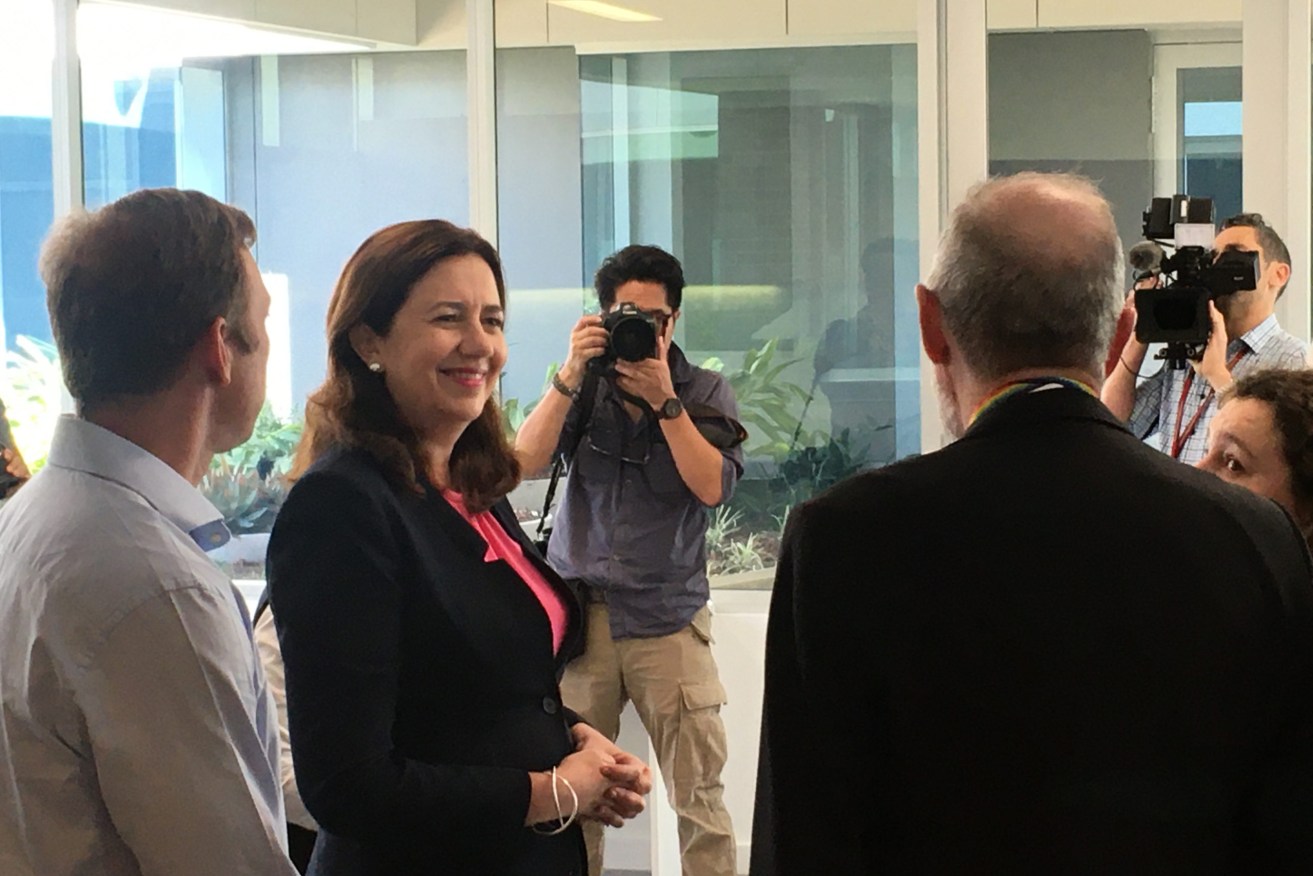Premier’s anniversary pledge to win back the love
Today, on her fifth anniversary as Premier, Annastacia Palaszczuk awoke to news that a poll had found more Queenslanders unhappy with how things were going for the state.

Premier Annastacia Palaszczuk inspects work on Jacaranda Place, a youth mental health treatment facility in Brisbane.
If this were a marriage, and wood the traditional anniversary gift, Palaszczuk might be forgiven for thinking voters were getting old-school baseball bats ready for her government, ahead of the October election. That’s a harsh wake-up call, and on Valentine’s Day no less.
The baseball bats line was one famously used by the late Labor premier, Wayne Goss, in describing the inevitable downfall of the Keating government federally after his own defeat. But the downfall of the Palaszczuk government is not inevitable, and it may depend, conversely, on the fortunes of the Federal Morrison government.
It also appears that Palaszczuk, who has long positioned herself somewhat above government, rather than being ‘of government’, will do whatever it takes to regain the love of Queenslanders. Perhaps Palaszczuk is rolling up her sleeves, ready to fight with and for her beloved Labor Party, even if it means making tough decisions and a few enemies along the way.
Amid ongoing speculation about the performance of Deputy Premier and Treasurer Jackie Trad, the subject of a conflict of interest scandal last year, Palaszczuk today accepted the integrity issue had damaged her government.
“I’m the first person to admit it and I’m quite sure Jackie admits it as well,” Palaszczuk told reporters.
Asked about the latest negative poll in The Courier-Mail, the premier said she welcomed criticism. Pointedly, after backbench rumblings about Trad and factional meetings, Palaszczuk said she would prefer MPs raise concerns in Caucus rather the media.
She insisted Labor had delivered on its promise of a better way of governing, and was more stable than the one-term Liberal National Party government of former Premier Campbell Newman.
But in her strongest comments about her side to date, she also made a veiled threat that non-performing ministers could still be sacked, something she has been loathe to do in the past.
“I believe that everyone in our Cabinet has a responsibility to step up or step out,” Palaszczuk said.
Palaszczuk grew up in a working-class suburb, in a Labor household complete with a Gough Whitlam poster on the wall. When she went overseas to study, it was to the United Kingdom, where she was swept up in the “New Labour” movement. Her father, Henry, was a minister in the Queensland Labor government of Peter Beattie, during which time she worked for a period as a ministerial adviser. Ultimately, Palaszczuk took over her father’s seat of Inala, in 2006, and rose to become a minister under then premier Anna Bligh. Then, after 14 years of Labor rule in Queensland, the empire came crashing down around her.
Palaszczuk was one of only seven Labor MPs in an 89-seat parliament to retain their seats. So resounding was the Liberal National Party victory, it was thought that Labor would be rebuilding its stocks from opposition for several terms. And despite her Labor pedigree, when Palaszczuk took the leadership nobody expected very much of her. There was too much work to do, and she hadn’t exactly proven herself. Some of the faithful started looking away. It was all too hard, maybe even impossible, especially for Palaszczuk.
But then Palaszczuk did the unthinkable, leading Labor to victory at the very next election and bringing down the Newman government. As she said in that campaign launch, Labor was knocked down but “got up off the mat”. What’s more, despite all the signs that her new administration wasn’t ready for government, Palaszczuk saw Labor easily re-elected. And here she is today, visiting a hospital to inspect work to repair the damage she says was done by the LNP.
“Every single day I wake up and think about the people of this state, and what more I can do,” she said, getting “very emotional” as she launched Jacaranda Place, which replaces the abruptly closed Barrett Centre.
Part of Palaszczuk’s success, to date, has come from being under-estimated by her opponents. She is plain-spoken and, despite that surprise summer-time debate about her choice of clothes, no slick political operator. But part of Palaszczuk’s longevity has also been due to how she has positioned herself as Premier – leading a government, but not necessarily a product of government, almost detached from the normal politico-media bubble, if not the daily grind of bureaucracy and due process as well. This positioning gives her the flexibility to respond to issues how she sees fit, not dragged into the trenches, tarnished by the machinery. Palaszczuk, to voters at least, might seem stoic, and, in the media spotlight, sometimes dismissive or incredulous, which doesn’t necessarily hurt her reputation. More president than premier, Palaszczuk has grown comfortable in this role over the past five years, and made it her own. But for how long?
The economy remains the priority for voters. That is why there will be an early state budget, and why Palaszczuk government ministers have ramped up the attack on Canberra. But there are also simmering state issues, underlying tensions in the party, and a balance sheet that could be interpreted in different ways, depending on what you believe a government should be doing in these tough times. The LNP Opposition could do better.
Voters would be forgiven for thinking that if the Premier isn’t responsible, who is? How Palaszczuk answers that question will determine whether she is given a sixth, seventh or eighth year as premier.












